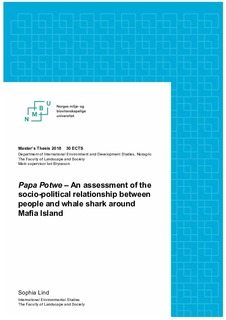| dc.description.abstract | Amongst the many species targeted for aquatic tourism, we find the whale shark, also known as the largest living fish in the ocean. This species is known for migrating over large distances and can be found in several locations around the world near Equator. However, the whale sharks spotted in the Mafia waters, located at Tanzania’s west coast, seem to have a more permanent stay around the island. Its permanent stay is believed to create a relationship between the whale shark and the people resident at Mafia. For the fishing communities at this island, the whale shark is believed to provide an advantage as it is a sign for fish which makes it easy for the fishermen to locate their catch. The relationship between fishermen and whale sharks is not some thing new, but are believed to have existed for a long time.
However, a new type of relationship between people and whale sharks at Mafia Island has developed. Mafia has experienced a rapid growth in the tourism, especially after 2010. The purpose for visiting the island seems, for most tourists, to be the opportunity to swim with and experience the whale sharks. In addition, fishermen claim that overfishing and poor regulation other places in Tanzania have led to more fishermen to the Mafia waters. The rapid growth in tourism and the expanding amount of fishermen to the Mafia coast has lead to an increasing number of boats in the whale sharks habitat around Mafia Island. The interaction from such activities might be crucial for the whale sharks vulnerability and future in this area.
This study attempts to investigate people’s perceptions of the whale sharks, how the people interact with this species, and whether this interaction can affect the whale sharks vulnerability. This issue was investigated through a case study of the whale sharks presence around Mafia Island. The study was conducted at Mafia Island from October to December 2017. The data collection were carried out by using a mixed method approach, combining both qualitative and quantitative methods, such as desk studied, interviews, a questionnaire and observations. The results were discussed with aspects from the conceptual frameworks of political ecology and vulnerability in order to answer the research question. | nb_NO |

